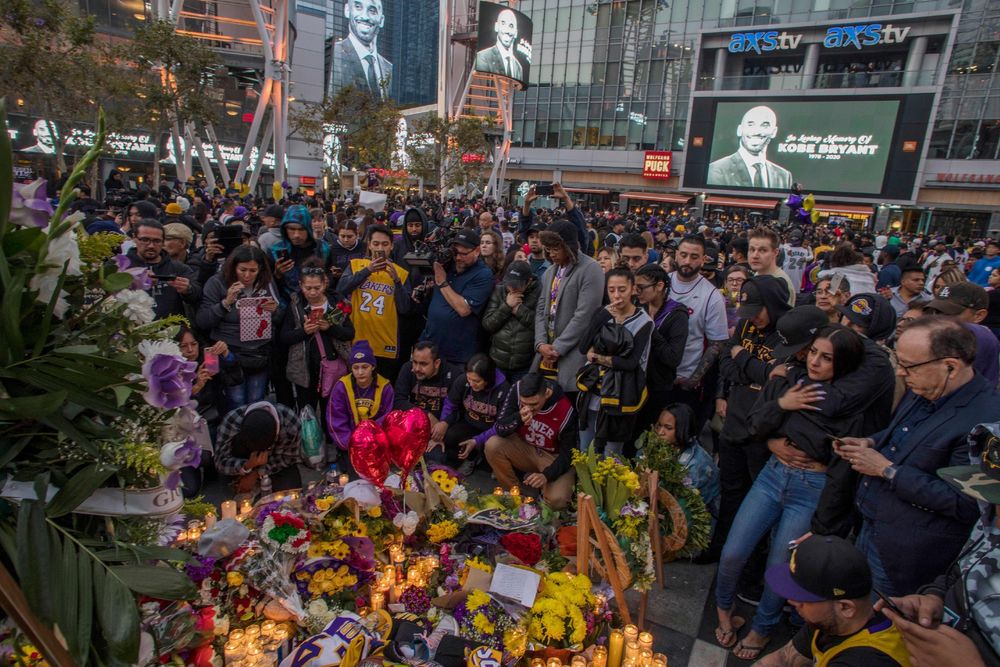Even a year after Kobe Bryant’s death, his memorial service at the Staples Center still feels like something ripped from our darkest dreams. Some of our most visible sports heroes emoted in ways we hadn’t really seen before or even imagined possible. There was Shaq, the hulking Superman who had torn down rims and plowed through grown men, weeping over both his former teammate and his sister, whom he’d lost to cancer months prior. We saw Michael Jordan, a man we’d only seen cry when winning championships or lamenting that he couldn’t rip out people’s hearts on the court anymore, sobbing. They were only two of the brotherhood mourning that day, coming to grips with the fact that a freak helicopter crash had killed a generational star, his daughter, and their friends — a community of Black men showing more sadness than we usually allow ourselves to express.
It should have been a defining moment of 2020. Instead, it became a harbinger.
Two weeks after that late February memorial, we were all locked in our homes trying to survive the onset of a pandemic that would go on to kill more than 400,000 Americans. Three months after that memorial, the video of Derek Chauvin kneeling on George Floyd’s neck led to the largest mass protests in American history. Almost a year after that memorial, White insurrectionists stormed the Capitol with the hopes of sparking a coup and civil war. In between, we lost Chadwick Boseman, John Lewis, parents, elders, hugs, and daps.
We cried together and said “I love you” to other men more than we ever have. We squeezed our kids tighter and talked to professionals about filling out our wills. We buried people we thought we’d have forever and stayed up at night wondering what we’d leave behind if a pandemic or freak accident ripped us away.
Yet, I don’t think we ever quite answered why it was Kobe, of all celebrities, whose passing hit us so hard. Was it the unexpectedness of his death? The reminder that our lives are only as guaranteed as the whims of a wind gust, or the thickness of the fog billowing above a city of angels? Was it the way Kobe felt immortal, like a force of nature, like a river? Was it the thought of him holding Gigi as the helicopter descended, the idea of him promising her everything would be okay? The folly of thinking we can save our children from the chaos of the world?
Whatever the case, that wave of emotions broke through the dams that men had spent our entire lives building, slab by socially reinforced slab. Our raw responses to the loss of Kobe were messy, unrefined — and still, I think, unresolved. We lashed out at women like Gayle King for trying to make us reckon with the complications of Kobe’s past. We fired off performative #GirlDad posts without interrogating what that means. We hung on the Lakers’ every ensuing win like a promise that we were going to get a storybook ending.
And we just kept feeling sad.
Kobe Bryant’s death was always going to be a tragedy we’d have difficulty coping with. But a year later, it holds a different meaning. That loss was really the beginning of a year of communal sadness beyond what so many of us thought possible. The beginning of a worldwide spiral that we’re still spinning in. For men, it marked the beginning of a year in which we were as outwardly sad as we’ve ever been. We cried together and said “I love you” to other men more than we ever have. We squeezed our kids tighter and talked to professionals about filling out our wills. We buried people we thought we’d have forever and stayed up at night wondering what we’d leave behind if a pandemic or freak accident ripped us away. And through it all, we thought about Kobe.
The Kobe Bryant memorial service, in a very twisted poetry, was the last communal nationwide gathering where we all felt safe. Yet, the world spun out of control and into chaos before we could heal. Before we could sit in our contradictions, enabling, and reckoning. Our healing was deferred. Instead, we put Band-Aids on the cracks and prayed that the water wouldn’t drown us.
I worry about what will happen next when the daily death toll starts to drop; when thousands turn to hundreds and then dozens and we start to go outside and touch again. When we take time to assess the wreckage. When the floodwaters drain and we’re left to look at the molded floors, the misshapen furniture, and the dilapidated structures left in place. Then what do we do?
It still doesn’t feel real, a year later, to talk about Kobe Bryant in the past tense. It still feels like he should have popped up somewhere to clown Jalen Rose over his 81-point game anniversary last week. It still feels like we should be watching HoopMixtape clips of Gigi crossing up defenders. I wonder if that feeling will ever go away. I wonder if I even want it to.
